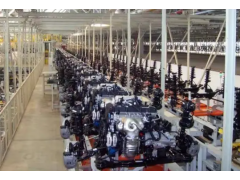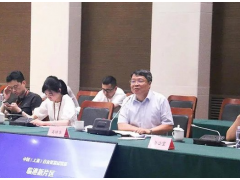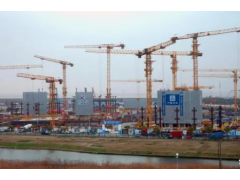In the face of profound and complex changes in the current global economic and political landscape, building a transparent, shared, and predictable RCEP requires active promotion at the government level, as well as proactive measures at the information, industry, and local levels. Chi Fulin, President of the China (Hainan) Reform and Development Research Institute, recently put forward the following 8 suggestions on practically promoting the RCEP process at the seminar on "New Globalization, RCEP and the Future of Chinese Cities".
Shorten the transition period and promote the implementation of RCEP tariff reduction commitments as soon as possible. It is suggested that on the basis of the existing commitments, we should jointly negotiate to shorten the "zero tariff" transition period for important raw materials and key components as much as possible, so as to ensure the stability and safety of the industrial chain and supply chain in the region; give full play to the role of China's large import market, and create conditions to realize tariff reduction as soon as possible. Let the commitments be fully implemented to make the Chinese market a large market shared by RCEP; promote the transition from "country tariff reduction" to "unified tariff reduction" in China, Japan, South Korea, Indonesia and other countries, and promote the construction of a regional unified market.
Promote the transformation of the RCEP origin accumulation rules to full accumulation. The cumulative rules of origin are a major achievement of RCEP. From a practical point of view, the dividends of the cumulative rules of origin are still to be released. In 2022, the export value of Chinese enterprises using the RCEP rules of origin will only account for 3.56% of their total exports to other RCEP member countries. It is recommended to promote the transition from "accumulation at origin" to "full accumulation" that includes the processing and value-added part of non-originating goods into the scope of accumulation as soon as possible, as a follow-up consultation topic for RCEP accumulation rules, which will significantly improve the convenience of enterprises using the rules; promote the original RCEP The review of the self-declaration clause of the origin enterprise, that is, the origin declaration document issued by the traders of the RCEP member countries is allowed to have the same effect as the origin certification document issued by the visa agency.
Promote the realization of negative list management for trade in services. In order to fully release the huge room for the development of service trade in the region, it is recommended to formulate and implement a national version of the negative list of cross-border service trade, and implement the commitments in advance of opening up in areas including professional services and computer services; We will take the initiative to expand the import of high-quality services from other RCEP member countries with ASEAN as the focus; accelerate the China-ASEAN Free Trade Area 3.0 negotiations with the focus on service trade, and strive to form a China-ASEAN cross-border service trade freedom higher than RCEP Facilitated institutional arrangements; use the free and convenient institutional arrangements for trade in services formed between China and Japan for the first time to promote an important breakthrough in the development of bilateral productive service trade.
Adapt to the development of RCEP trade and improve the consistency of domestic and international standards. From a practical point of view, the technical barriers to trade caused by standard differences have become an important factor restricting the release of the potential of RCEP economic and trade cooperation. It is recommended to formulate an ASEAN-oriented product and service standard differentiation liability exemption catalog. For industries and businesses in the catalog, foreign companies are allowed to choose Chinese standards or local standards, so as to minimize trade costs caused by standard differences; carry out bilateral and multilateral standards in the RCEP region Negotiate mutual recognition, establish a green channel for domestic application of international standards, and promote the application of more international standards in China; support relevant think tanks and research institutions to carry out research on technical barriers to trade, and timely summarize and release RCEP member countries' conformity assessment market access systems and related adjustments information.
Set up cooperation demonstration zones to promote high-quality implementation of RCEP by local governments. Support qualified localities to carry out pilot trials and cooperative explorations with standards higher than the current RCEP rules, and form a leading demonstration of China's high-quality implementation of RCEP. It is recommended to support the Hainan Free Trade Port while making full use of the superimposed effects of RCEP rules such as rules of origin and service trade liberalization, and at the same time carry out high-level open stress tests against the standard CPTPP to explore paths for subsequent RCEP upgrades and expansion; support domestic free trade pilot zones to Take the lead in fully implementing the relevant rules of RCEP to achieve strategic improvement, and give it greater autonomy in reform and opening up, focusing on the provisions of RCEP that express relative principles and greater government discretion, and carry out institutional innovation; support Guangdong, Guangxi and other countries and regions Areas with close economic and trade ties among ASEAN countries will build regional and country-specific markets with their own characteristics, aiming at different member states, and create advantageous industrial clusters oriented to RCEP.
Implement a number of special actions to guide enterprises to deeply participate in RCEP cooperation. It is recommended to implement the "going out" action of enterprises, support enterprises to use RCEP rules to invest in the fields of agriculture, digital economy, energy industry and other fields in relevant ASEAN countries; carry out industrial chain supply chain optimization and adjustment actions, and support enterprises to improve the security of industrial chain supply chain Oriented, make full use of RCEP’s cumulative rules of origin to carry out the layout of the industrial chain and supply chain, cultivate and build a diversified supply network; implement the transformation and upgrading of the manufacturing industry, encourage enterprises to actively use advanced technologies from other RCEP member states, strengthen resources, technology, and equipment support, and promote Transformation and upgrading of traditional manufacturing industries; implementation of corporate trade optimization and adjustment actions, assisting companies in developing RCEP export markets with ASEAN as the focus, and promoting further agglomeration of export markets to RCEP regions.
Focus on RCEP capacity building to strengthen supporting services for enterprises. To improve the utilization rate of RCEP rules by enterprises, it is recommended to establish an RCEP capacity building center for government officials and entrepreneurs of ASEAN countries in Hainan Free Trade Port, and to carry out special training and typical case presentations on the application of RCEP rules; Special aid projects for underdeveloped countries to carry out professional education and training assistance for small and medium-sized enterprises in the fields of digital skills, professional services, science and technology, public health, and personnel training; formulate the "Guidelines for the Compliance Management of Enterprises' Foreign Investment and Overseas Operations", And form a regular update mechanism, focusing on the formation of basic compliance standards for local safety review, industry supervision, foreign exchange management, labor management, environmental protection and other regulations.
Actively participate in the construction of RCEP governance mechanism and organizational system. Under the premise of respecting the centrality of ASEAN, actively participate in the construction of the RCEP governance mechanism and organizational system. It can negotiate and cooperate with ASEAN to promote the establishment of the RCEP Secretariat; actively participate in the establishment of four professional committees to be set up under the RCEP Joint Committee, the Goods Committee, the Service and Investment Committee, the Sustainable Development Committee, and the Business Environment Committee, and actively participate in the competition for important positions Accelerate the promotion of Hong Kong's accession to RCEP, and rely on the existing economic and trade cooperation network in the Mainland to attract relevant countries inside and outside the region to join RCEP; actively build RCEP dispute resolution electronic service platforms and other public service platforms to support small and medium-sized enterprises in the region to carry out dispute resolution at a lower cost.




